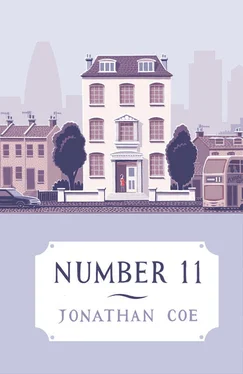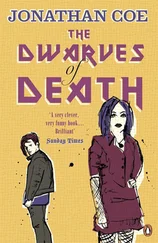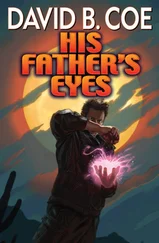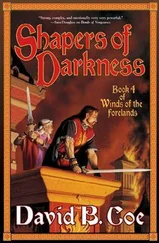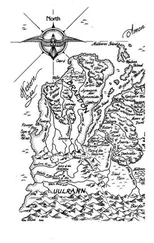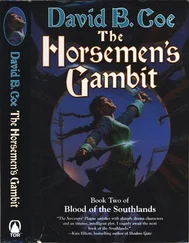‘Are you OK?’
‘My leg still hurts from where I fell out of that tree, you know.’
‘In the same place?’
‘Yeah.’
I looked around anxiously, prey to a growing, irrational sense that we were being watched. Then I noticed something.
‘What are you sitting on?’
‘Eh?’
Alison realized, for the first time, that she had sat down on some kind of metal armchair, surrounded by overgrown bushes, some of which had tangled themselves around it, tethering it to the ground. It was, in fact, a wheelchair. She rose to her feet quickly, as if she had come into contact with something contaminated.
‘Woah! What’s that doing here?’
‘It must have been Mrs Bates’s,’ I said, trying and failing to pull a rope of ivy out from between the spokes of one wheel. ‘It must have been here since she died.’
‘God, that’s freaky. Come on, let’s take a look through the windows and then get out of here.’
We crept nearer to the front of the house. We now had our noses up against the netting, and one or two of the bolder, more inquisitive birds hopped from their leafy perches to take a look at us. They might have been hoping for crumbs of bread but we had nothing to give them. Peering through the thick tendrils of ivy, we could just about see into one of the downstairs windows, but the room beyond seemed to be empty and was in any case so dark that we could make nothing out, except that there appeared to be a large, gloomy picture hanging on one of the walls. The second downstairs window looked into the same room. Once we had done this I felt that honour had been served and we could beat a dignified retreat.
Alison, however, had other plans.
‘ Now where are you going?’ My voice was tight with panic.
‘Oh, come on, there’s no one around.’
‘How do you know that?’
I hurried to catch up with her as she made her way down the little alleyway at the side of the house.
‘What are we looking for anyway?’
‘I don’t know,’ said Alison, in a preoccupied way, glancing from side to side. The alleyway was strewn with rubbish, besides containing three green wheelie bins which were also full to overflowing. I noticed a lot of old brushes and paint pots. ‘I just wanted to get an idea … a feel for what this —’
She stopped in mid-sentence. Froze, would be a more accurate way of putting it. Her gaze was fixed on a long, thin window at the back of the house, just above ground level, beneath the level of the room we had just been looking into. A basement window, in other words. Behind the dust-and dirt-streaked glass was the bright yellow glow of a powerful light bulb. It was the glow that enabled us to see, quite clearly, the shadow of a human figure in sharp outline.
The figure was in profile. He (or she) was standing (or more likely sitting) perfectly still. We could see the suggestion of a face in silhouette: a short, flat nose, a pointed chin with skin hanging loosely beneath it, straggles of thin, uncombed hair reaching almost down to the shoulders. That was about all we could make out, but it was enough for Alison to exclaim, in an awestruck whisper:
‘That’s him! I mean — that’s her — it — whatever it was …’ And finally, just to spell it out for me: ‘ That’s who I saw yesterday in the woods. ’
Our eyes met as the reality of the situation began to sink in. Neither of us could explain things, neither of us knew what was going on, by any means, but we were both convinced, now, that we had stumbled upon something huge: something sinister and secret and potentially explosive. This was the biggest, most shocking thing that had ever happened to either of us.
Suddenly, high up in the house, a sash window was yanked open and a woman’s voice shouted:
‘ OY! YOU TWO! ’
We did not even look up to see her face glowering down at us. We turned and ran: out through the front garden, back down Needless Alley, faster than we could have believed possible.
It was late that night, when the lights were out and I was almost asleep, that Alison had her brainwave.
‘Oh. My. God,’ she said, sitting up in bed slowly. ‘I think I’ve got it. I know what’s going on in that house.’
I sat up too, and waited for the explanation. ‘Well?’
‘Have you seen Psycho ?’ Alison asked.
‘ Psycho ? The film? Are you serious? Of course I haven’t seen Psycho .’
‘You’ve heard about it, though, right?’
‘I’ve heard that it’s the scariest, most horrible film ever made. Why?’ I couldn’t stop myself asking the question, even though the answer was pretty predictable. ‘Don’t tell me that you’ve seen it?’
‘’Course I have. My babysitter brought it round and I watched it with her, about three years ago.’
‘Your babysitter? ’ Every time I got these little insights into Alison’s life I was torn between horror and envy.
‘Sure. She was cool. Anyway, you do know what the story’s about?’
‘Can you remind me?’ I said, not having a clue.
‘There’s this mad guy — he’s the psycho — who lives in this big old house by the side of the road. Next to the house is this motel that he runs, and when this woman comes to stay there for the night he kills her while she’s having a shower. So then her sister comes looking for her and meets this man and straight away she can tell he’s some kind of psycho, so she goes into the big old house to look for his mother, ’cause she thinks he might be keeping his mother captured there or something. So she goes down to the cellar and finds his mother sitting there in a chair. Only she’s dead.’
‘Dead?’
‘Yeah. Turns out she’s been dead for years and he’s been keeping her body in the house with him all that time. Sometimes he keeps it in the cellar and sometimes he takes it upstairs and lies it down on the bed.’
I thought about this and a practical difficulty occurred to me. ‘Don’t people start to … smell a bit, after they’ve been dead for a few days?’
‘He’s been pickling her,’ said Alison, matter-of-factly.
I pictured an old lady’s body being squeezed into an enormous jar, filled with the same horrible-tasting liquid I’d seen in Mum’s jars of pickled onions. How on earth this would be feasible was quite beyond my imagination; but right now that seemed the least of my problems.
‘You don’t mean …’
‘Why not? Didn’t your gran say there was something fishy about the old lady dying and leaving her the house?’
‘Yes, but … If you killed someone to get their house, why would you keep their body? You’d want to get rid of it, wouldn’t you?’
‘A normal person would, yes. But this is the Mad Bird Woman, remember?’
The objections to this theory were numerous, I thought.
‘But you saw the dead body in the woods , not the house.’
‘Yes. She’d taken it there.’
‘Why?’
‘I don’t know. To give it some exercise and fresh air. Rachel, she’s mad . Totally crazy. Who else would live in a house covered with birds?’
‘How would she carry the body into the woods? It’d be too heavy.’
Alison was silent, and for a moment I thought that I’d actually scored a point. But the victory was short-lived.
‘Of course — the wheelchair! That’s why she’s still got the wheelchair in her garden.’
I wasn’t convinced by this for long, either. ‘But it was covered in ivy and stuff. It looked like it hadn’t been used for months.’
Alison ignored this objection, and played her trump card. ‘Never mind that. In the film, do you know what the psycho’s name is? Norman Bates. His mother’s name is Mrs Bates. Mrs Bates .’
Читать дальше
